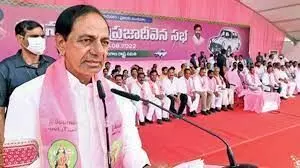KCR's legacy: Progression, critiques and unfinished agendas
With surprising results and an unmatched fervour that the State had never seen before David usurped Goliath!
image for illustrative purpose

Hyderabad: The recent election campaigns were marked by vigorous canvassing and strategic manoeuvring by competing parties and their leaders. The BRS, pitched its achievements in governance, focusing on welfare schemes, development initiatives, and regional aspirations. Opposition parties leveraged discontent, highlighting issues like unemployment, agrarian distress, and governance challenges to sway voters.
The voter turnout and demographics played a pivotal role in shaping the election outcomes. The participation of urban and rural voters, coupled with the influence of caste dynamics and regional sentiments, created a mosaic of preferences. The changing demography and socio-economic factors brought new dimensions to the electoral calculus, potentially reshaping traditional voting patterns.
As the dust settled after a highly contested electoral battle, the results bore testimony to the aspirations and verdict of the masses. The masses proved that this time round, their preference lay in promises that one could keep and no amount of the mirage of a ‘Golden Telangana’ could sway them. Revanth Reddy of the Congress party was the chosen man.
Telangana, a state known for its distinct political fervour and historical significance, recently witnessed the democratic spectacle of state elections. The battle for power and governance unfolded against a backdrop of entrenched political dynamics and pressing regional issues. With surprising results and an unmatched fervour that the State had never seen before David usurped Goliath!
Telangana became India’s 29th state in 2014, marking a significant moment in its distinct history and long fight for statehood. Before the 2023 elections, the political scene here was buzzing with energy. Big players like the BRS, Congress, BJP and others were all competing fiercely to gain control.
K. Chandrashekar Rao (KCR) and his tenure as the head of Telangana:
KCR, has been the face of Telangana politics for over a decade, leading the region through significant political transformations and developmental initiatives. As the founding chief minister of the state after its formation in 2014, his administration has been marked by a blend of assertive leadership, ambitious projects, and a distinctive persona.
Known for his strong grip on governance and often praised for his proactive approach towards addressing regional aspirations and developmental challenges, KCR’s government initiated several welfare schemes targeting various sections of society, aiming to uplift the marginalized and rural populations. Key projects such as "Mission Bhagiratha" (providing safe drinking water to all households) and "Mission Kakatiya" (revival of tanks and lakes) exemplify his emphasis on infrastructure and rural development.
During his time in charge, Telangana saw some big plans take shape to improve its infrastructure and economy. One standout was the Kaleshwaram Lift Irrigation Project, hailed as the biggest multi-stage lift irrigation project globally. This project was a clear sign of the government’s dedication to tackling water scarcity and supporting agriculture. KCR’s emphasis on irrigation schemes and building up infrastructure has been a key part of his vision for a strong and self-reliant Telangana.
Needless to say, many of these ambitious projects reflected KCR’s leadership style which reflected a blend of assertiveness, pragmatism, and regional pride. Known for his direct and decisive approach, he was perceived as a leader who took calculated risks to achieve his vision for the state. His unwavering commitment to the Telangana cause during the statehood movement earned him respect and support among the masses. However, his critics often highlight his autocratic tendencies and centralization of power within his family and his party.
Having the distinction of being the Chief Minister of a newly formed state, KCR made a significant impact on Telangana’s political and developmental journey. His projects and plans were noteworthy. At the same time, they had critics questioning the viability and sustainability of these projects in the long run, their financial effects, and possible environmental impacts. The way power was consolidated within his party led to discussions about democratic processes and the role of opposition in the State.
The real persona of KCR?
KCR's leadership style is often criticized for centralizing power within his party and the state administration. Critics argue that this concentration of authority might undermine democratic principles by limiting the space for dissent and opposition voices. Some view KCR's leadership as exhibiting autocratic tendencies, where decision-making processes might lack inclusivity and consultation, leading to unilateral decisions that may not consider diverse perspectives. There have been allegations of favouritism and nepotism within the TRS party, with key positions often occupied by KCR's family members. This dynastic approach to politics has drawn criticism about fairness and transparency in the political system.
Though his ambitious projects for infrastructure and development were welcomed there were concerns about the financial burden these mega projects might impose on the state's economy in the long run.
Some of the large-scale projects, especially the irrigation projects and infrastructure, have raised environmental concerns. Critics highlight potential ecological impacts and the sustainability of these projects on natural resources.
He also has faced criticism for his handling of opposition voices, with allegations of suppression of dissent through legal means or bureaucratic hurdles, potentially stifling healthy democratic discourse.
Critics point out that despite the emphasis on various developmental projects, the administration might not have adequately addressed issues of job creation and sustained economic growth, especially for the youth and marginalized sections of society.
The lack of clarity surrounding his intentions over his once-claimed passion for Telangana has sown the seeds of discontent among the electorate. The man may have had charisma and swayed his voters with his magniloquence, but he clearly blurred the lines between inconsistency and aspirations. The recent debacle at the polls has once again raised the question of why didn’t Goliath ever learn his lesson.

